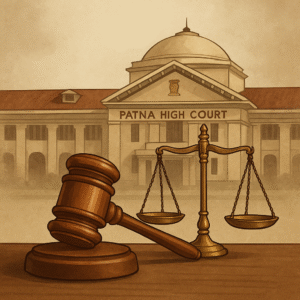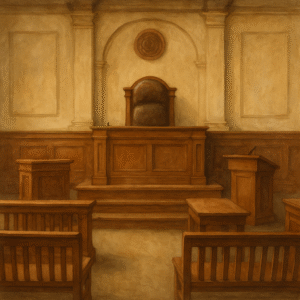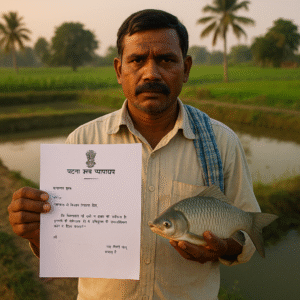Simplified Explanation of the Judgment
In this case, the Patna High Court examined whether a government department could blacklist a registered contractor for ten years without following proper legal procedure. The petitioner, a Class-I registered contractor with the Bihar Minor Irrigation Department, had participated in a government tender for renovation and restoration works in several districts.
During the tender evaluation process, a competing contractor alleged that some participants had submitted forged or tampered eligibility certificates. The department’s Technical Bid Evaluation Committee disqualified the petitioner and recommended further action. The Departmental Tender Committee directed the Chief Engineer to initiate proceedings. Following this, the Executive Engineer issued a notice dated 11.10.2022 asking why action should not be taken under the Bihar Contractors Registration Rules, 2007 for allegedly tampering with the “work done value” in submitted documents.
The petitioner replied on 05.12.2022, denying wrongdoing and explaining the circumstances. However, on 20.02.2023, the In-charge Chief Engineer blacklisted the petitioner for ten years under Rule 11(a)(vii) of the 2007 Rules. The petitioner challenged both the show cause notice and the blacklisting order, arguing:
- The notice was issued by an incompetent authority (Executive Engineer instead of the Registering Authority).
- The notice did not specify that blacklisting was being considered, violating the principle that a party must be informed of the proposed action.
- The allegations were vague and lacked evidence.
- The order of blacklisting was non-speaking, meaning it gave no reasoning for rejecting the petitioner’s reply.
- Blacklisting for ten years was excessive and disproportionate, especially since registration is valid for only five years.
The respondents defended their action, claiming that due process was followed, the petitioner had admitted submitting a forged document, and blacklisting was justified to deter similar misconduct. They relied on Supreme Court rulings cautioning courts against interference in tender-related matters unless arbitrariness or mala fides were proven.
The High Court examined the law on blacklisting, citing Supreme Court decisions such as Erusian Equipment (1975), Raghunath Thakur (1989), Gorkha Security Services (2014), UMC Technologies (2021), and Kulja Industries (2014). These cases emphasize that:
- Blacklisting has serious consequences and must follow the principles of natural justice.
- The contractor must be given a clear show cause notice stating the proposed action.
- The decision must be reasoned and proportionate to the alleged misconduct.
The Court found that:
- No proper show cause notice specifically for blacklisting was issued. The earlier notices only referred to possible action for “tampering” under the 2007 Rules but did not mention blacklisting.
- The final order was non-speaking, lacking reasons for rejecting the petitioner’s defence.
- The penalty of ten years’ blacklisting was disproportionate and excessively harsh.
As a result, the Court set aside the blacklisting order dated 20.02.2023 and remanded the matter to the competent authority for fresh consideration, to be completed within three months, in compliance with natural justice and proportionality principles.
Significance or Implication of the Judgment
This judgment reinforces the importance of procedural fairness in government decision-making, especially when blacklisting contractors. It warns departments that:
- Only the competent authority can initiate such proceedings.
- The show cause notice must clearly state the proposed punishment.
- A blacklisting order must be supported by clear reasoning.
- Penalties must be proportionate to the alleged offence.
For contractors, it highlights that they can challenge departmental actions in court if due process is not followed. For the government, it serves as a reminder that strict adherence to principles of natural justice is mandatory to avoid court intervention.
Legal Issue(s) Decided and the Court’s Decision with Reasoning
- Issue 1: Whether blacklisting can be imposed without a specific show cause notice mentioning the proposed penalty.
Decision: No. Such omission violates the principles laid down in Gorkha Security Services. - Issue 2: Whether a non-speaking order of blacklisting is valid.
Decision: No. Orders must contain reasons and address the defence raised by the affected party. - Issue 3: Whether a ten-year blacklisting was proportionate in this case.
Decision: No. It was found excessively harsh and disproportionate, especially given the five-year validity of registration. - Issue 4: Whether the competent authority had followed natural justice.
Decision: No. The lack of a proper notice and reasoning amounted to procedural unfairness.
Judgments Referred by Parties
- Shobikaa Impex (P) Ltd. — Cited by respondents.
- Silppi Constructions Contractors v. Union of India — Cited by respondents.
Judgments Relied Upon or Cited by Court
- Erusian Equipment and Chemicals Ltd. v. State of West Bengal, AIR 1975 SC 266.
- Raghunath Thakur v. State of Bihar, (1989) 1 SCC 229.
- Gorkha Security Services v. Govt. (NCT of Delhi), (2014) 9 SCC 105.
- UMC Technologies (P) Ltd. v. Food Corporation of India, (2021) 2 SCC 551.
- Kulja Industries Ltd. v. Western Telecom Project BSNL, (2014) 14 SCC 731.
- M.P. Power Management Co. Ltd. v. Sky Power Southeast Solar India (P) Ltd., (2023) 2 SCC 703.
Case Title
CWJC No. 3860 of 2023 — Contractor v. State of Bihar & Others
Case Number
Civil Writ Jurisdiction Case No. 3860 of 2023
Coram and Names of Judges
Hon’ble Mr. Justice P. B. Bajanthri
Hon’ble Mr. Justice Arun Kumar Jha
Names of Advocates and Who They Appeared For
For the Petitioner: Mr. Prabhat Ranjan, Advocate; Mr. Chandan Kumar, Advocate
For the Respondents: Mr. Ajay Kumar, G.A.-9
Link to Judgment
https://www.patnahighcourt.gov.in/ShowPdf/web/viewer.html?file=../../TEMP/578ea692-7ae7-4596-9625-c0c3c169fac3.pdf&search=Debarment
If you found this explanation helpful and wish to stay informed about how legal developments may affect your rights in Bihar, you may consider following Samvida Law Associates for more updates.








